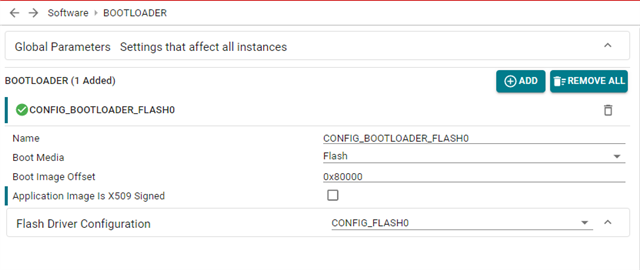Dear all,
I am writing to seek your assistance with an issue I am encountering while using Uniflash on my custom board.
My custom board utilizes a QSPI instead of the OSPI found on the EVM. To address this difference, I modified the sysconfig and successfully passed all QSPI-related tests.
Next, I attempted to rebuild the sbl_uart_uniflash example for the AM64x-EVM, located at "..\examples\drivers\boot", and adapt it for my board. Unfortunately, this was unsuccessful.
As an alternative, I tried building and running the unmodified sbl_uart_uniflash example for the AM64x-EVM. However, the program appears to get stuck at step 2, forcing me to cancel the operation.
Here is the output from the console:
C:\ti\mcu_plus_sdk_am64x_08_06_00_45\tools\boot>python uart_uniflash.py -p COM8 --cfg sbl_prebuilt/am64x-evm/default_sbl_null_hsfs_tq.cfg
Parsing config file ...
Parsing config file ... SUCCESS. Found 2 command(s) !!!
Executing command 1 of 2 ...
Found flash writer ... sending sbl_prebuilt/am64x-evm/sbl_uart_uniflash_hsfs_tq.tiimage
Sent flashwriter sbl_prebuilt/am64x-evm/sbl_uart_uniflash_hsfs_tq.tiimage of size 332110 bytes in 34.51s.
Executing command 2 of 2 ...
Command arguments : --file=sbl_prebuilt/am64x-evm/sbl_null.release.hs_fs.tiimage --operation=flash --flash-offset=0x0
Sending sbl_prebuilt/am64x-evm/sbl_null.release.hs_fs.tiimage: 0%| | 0/273693 [00:00<?, ?bytes/s]
[ERROR] XMODEM send failed, no response OR incorrect response from EVM OR cancelled by user,
Power cycle EVM and run this script again !!!
C:\ti\mcu_plus_sdk_am64x_08_06_00_45\tools\boot>python uart_uniflash.py -p COM8 --cfg sbl_prebuilt/am64x-evm/default_sbl_null_hsfs_tq.cfg
Interestingly, running the default_sbl_null_hsfs.cfg with the default sbl_uart_uniflash.release.hs_fs.tiimage works as expected.
It is important to note that I did not make any modifications to the SDK in use or Sysconfig of the example. I am currently using version 8.6.0.45.
I would be grateful if you could help me identify the cause of this issue. Additionally, I would like to know if it is possible to debug the SBL via JTAG by loading the application onto the EVM.
Thank you for your time and assistance.
Sincerely,
Isaac Yuki



